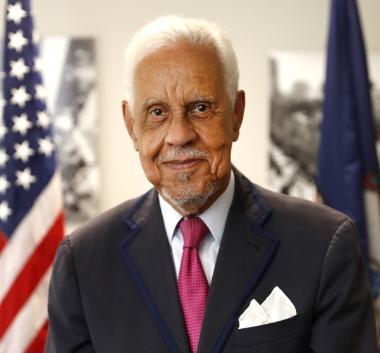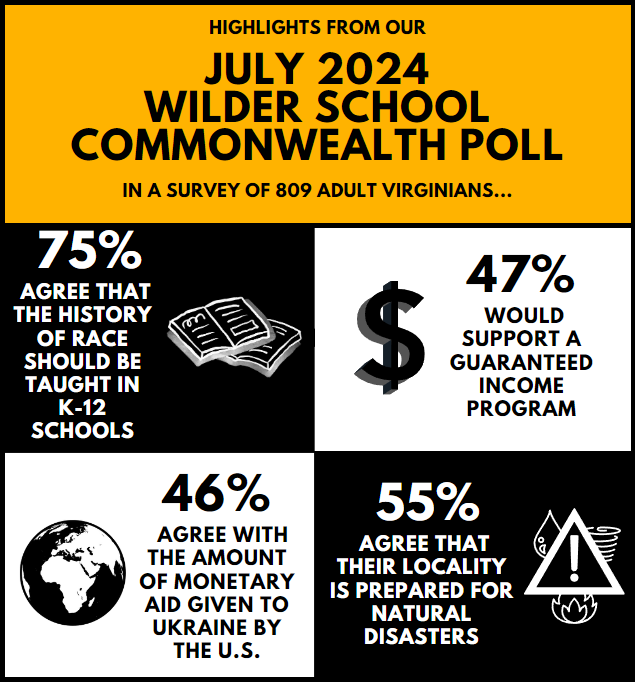CONTACTS:
Douglas Wilder
Distinguished Professor
Phone: (804) 827-0776
Email: ldwilder@vcu.edu
Robyn McDougle
Associate Dean of Research and Outreach
Phone: (804) 721-6703
Email: rdmcdougle@vcu.edu
RICHMOND, Va. (Aug. 9, 2024) - Today, the VCU Wilder School released the results of its most recent Commonwealth Poll, conducted between June 24 and July 3, 2024. The poll covered a number of issues ranging from education to foreign affairs to domestic affairs.
75% of Virginians agree that the history of race should be taught in K-12 schools, and high percentage of Virginians agree that VCU President Michael Rao should provide public accounting of money spent downtown real-estate development deal.
View the complete poll results
When asked about Israel’s military actions in Gaza, the most common sentiment is that Israel was justified in taking military action in Gaza, but it has now gone too far (39%)

“Three-quarters of Virginians (73%) agree that Governor Youngkin should have acted when he became aware of the spending of tax dollars resulting in a $100 million loss by the Health System. These results show that the people are always concerned about leadership, transparency, and accountability.” - Governor L. Douglas Wilder
On the issue of education, 75% of Virginians agree that the history of race should be taught in K-12 schools.
Regarding foreign affairs, a plurality of Virginia voters (39%) believe that Israel was justified in taking military action in Gaza, but that it has now gone too far, compared with 29% who feel that Israel is justified in continuing operations in Gaza. With respect to Ukraine, opinions were fairly evenly split, with slightly more people disagreeing (48%) than agreeing (46%) with the amount of money the United States has given Ukraine in its efforts against Russia.
Earlier this year, it was reported that VCU spent $73 million to back out of a development deal for the building of a new downtown facility with the city of Richmond. In the January 2024 VCU Wilder School Commonwealth Poll, 92% of those familiar with the deal wanted answers from the VCU Health Systems Board. Now, 84% of Virginians think President Michael Rao should provide a public accounting of where the money was spent. A report conducted by the Joint Legislative Audit and Review Commission (JLARC) also concluded that President Rao should not continue to serve on the Health System Board. President Rao has mentioned that his state high salary was justified due to his being President and Health Board Chairman. When asked whether they agree or disagree that President Rao should continue to receive this salary, which includes payment for that position, over half of participants (53%) disagree that he should continue to receive it. This percentage agreeing was consistent across all major demographic characteristics.
Douglas Wilder, the 66th governor of Virginia, said, “The poll results show that 75% of people agree that Virginia’s full history of race should be taught. The results further show that the people wanted answers from the VCU Health Systems Board for the waste of tens of millions of taxpayers dollars, some estimates as high as $100 million. President Rao has maintained that his salary was justified as he was President and Chairman of the Board. The General Assembly recommended that Rao not serve on the board; he subsequently has resigned from the board. Over half of participants (53%) don’t agree that President Rao should continue to receive his state-high salary.”
Wilder continued, “Three-quarters of Virginians (73%) agree that Governor Youngkin should have acted when he became aware of the spending of tax dollars resulting in a $100 million loss by the Health System. These results show that the people are always concerned about leadership, transparency, and accountability.”
Israel’s military actions in Gaza
When asked about Israel’s military actions in Gaza, the most common sentiment is that Israel was justified in taking military action in Gaza, but it has now gone too far (39%); 29% feel that Israel is justified in continuing to take aggressive military actions in Gaza, and 15% say Israel should not have taken any military action in Gaza. Opinions differ significantly based on political party — Democrats (59%) and independents (31%) are most likely to say that Israel was justified but has now gone too far, while Republicans are most likely to say that Israel is justified in continuing to take aggressive military actions in Gaza (53%). There was also delineation in opinion based on age, with respondents 54 and younger most likely to say that Israel was justified but has now gone too far (40%), while for those 55 and older, the most likely opinion was that Israel is justified in continuing its operations (45%).
U.S. monetary aid to Ukraine
According to the Council on Foreign Relations, the United States has provided Ukraine with $175 billion in ongoing aid in response to the February 2022 Russian invasion. Participants were asked whether they agree or disagree with the amount of monetary aid the United States has sent to Ukraine to assist in its war with Russia. Opinions were fairly evenly split, with slightly more people disagreeing (48%) than agreeing (46%). A majority of Democrats say they approve (64%), while Republicans and independents were most likely to disapprove (61% and 64%, respectively).
Natural disaster preparedness
As natural and environmental disasters like hurricanes, severe storms, flooding, drought and wildfires have increased in both frequency and strength over the past few decades, the impacts of those disasters are also becoming increasingly evident. These impacts include higher costs for disaster relief, more damage and more human lives lost during these disasters. Participants were asked how prepared or unprepared they think their locality is to deal with a major natural or environmental disaster. Over half of participants (55%) say their locality is prepared, while 33% believe their locality is unprepared. Opinions did not vary significantly based on respondent demographics or geographical location.
Guaranteed income program
Respondents were also asked how likely it is that they would support a statewide guaranteed income program for working individuals who do not qualify for public assistance programs, which involves providing a monthly cash payment of $500 for 24 months with “no strings attached.” Around as many people say they are likely to support the initiative (47%) as those who say they are unlikely to (45%). Democrats and independents were more likely to support a guaranteed income program (63% and 52%, respectively), while 64% of Republicans say they are unlikely to support such a program. Opinions also differ based on household income — nearly 6 in 10 (59%) of those with reported annual family income under $70k say they are likely to support a guaranteed income program, whereas 53% of individuals with a family income of $70k or more say they are unlikely to do so.
Teaching the history of race
When asked whether the history of race should be taught in K-12 schools in Virginia, over three-quarters of Virginians agree (75%), with just 15% disagreeing. Democrats overwhelmingly agree (92%), while a majority of Republicans and independents agreed at 65% of each group.
Respondents were also asked whether they agree or disagree that the history of race should be a required course in colleges and universities in the Virginia. Just under half of Virginians agree (49%), with 44% disagreeing. Democrats and independents were more likely to agree than to disagree (65% and 50%, versus 31% and 39%, respectively). Around 6 in 10 Republicans disagree (59%), with 33% agreeing that the history of race should be a required course.
VCU Health System development deal
At the beginning of June, the Virginia State Legislature released a report evaluating the Virginia Commonwealth University Health System Board and the Virginia Commonwealth University Board of Visitors. The report examined their participation in a development deal called the Clay Street project, which resulted in millions of dollars spent to exit the contract, for nothing in return with some cost estimates as high as $100 million. Participants were asked whether they agree or disagree that the President of VCU, Michael Rao, should provide a public accounting of where the money was spent. More than eight in ten people (84%) agree with 71% saying they strongly agree; just 5% disagree that President Rao should provide a public accounting.
The report also concluded that President Rao should not continue to serve on the Health System Board while President Rao has mentioned that his state high salary was justified due to his being President and Health Board Chairman. When asked whether they agree or disagree that President Rao should continue to receive this salary, which includes payment for that position, over half of participants (53%) disagree that he should continue to receive it.
Finally, participants were asked whether they agree or disagree that, when he became aware, Governor Youngkin should have acted on the spending of tax dollars resulting in a $100 million loss. Nearly three-quarter of Virginians asked (73%) agree that Youngkin should have acted, with over half indicating they strongly agree (54%) — and just 7% of participants disagreed.
About the VCU L. Douglas Wilder School of Government and Public Affairs
Ranked in the top 15% of graduate schools of public affairs in the nation by U.S. News and World Report , No. 39 in the top 40 Graduate Schools of Public Affairs, No. 6 in Homeland Security Programs and No. 33 in Public Management and Leadership Programs, the L. Douglas Wilder School of Government and Public Affairs at Virginia Commonwealth University advances excellence in governance and promotes evidence-based public policy in Virginia and beyond. The school offers an array of graduate, post baccalaureate and doctoral programs in virtually every policy area including criminal justice, homeland security and emergency preparedness, public administration, public policy and administration, and urban and regional studies and planning. Additionally, the Wilder School is home to a robust Centers and Institutes for Public Policy that provides applied research in the areas of state and local government, social equity, and leadership and a range of services to clients in state and local government, nonprofit organizations, businesses and the general public. Learn more at wilder.vcu.edu.
ABOUT THE VCU WILDER SCHOOL COMMONWEALTH POLL
For nearly three decades, the VCU Wilder School Commonwealth Poll within the Centers and Institutes for Public Policy has been an important bellwether for policymakers in Virginia and beyond on a range of topics, including voting intentions, economic and workforce development, education, housing, public health, public safety and racial equity. The Commonwealth Poll is a featured 2020 Presidential Election Poll by CNN, approved based on a rigorous review of methodologies and assumptions that ensure that CNN-cited polling entities are employing the gold standard in public opinion research.
Methodology
The Summer 2024 Commonwealth Poll, sponsored by Virginia Commonwealth University, obtained telephone interviews with a representative sample of 809 adults, ages 18 or older, living in Virginia. Telephone interviews were conducted by landline (202) and cell phone (607, including 426 without a landline telephone). The survey was conducted by Responsive Management. Interviews were conducted in English from June 24, 2024, to July 3, 2024.
In telephone survey research, design weights are often employed to reduce bias, correcting for differences in the probability of selection due to non-response and non-coverage. The sample was weighted to match Virginia’s adult population, which was the primary sampling unit. Two sampling frames were employed: one frame representing those with a listed landline and a second frame consisting of RDD cellular numbers. A two-stage weighting procedure was used to weight this dual-frame sample. Weighting was accomplished using the Anesrake package, which implements the American National Election Study (ANES) weighting algorithm. The margin of sampling error for the complete set of weighted data is ±4.81. A combination sample was used consisting of a listed landline sample and a cellular random digit dial (RDD) sample to represent all adults in Virginia who have access to either a listed landline or cellular telephone. Both samples were provided in their proper proportions according to state telephone type usage by Marketing Systems Group, a leader in providing research-based statistical samples. The cellular RDD sample was prescreened for disconnected numbers.
As many as seven attempts were made to contact every landline telephone number, and as many as five attempts were made to contact each cell phone number. Calls were made at different times of day and different days of the week to maximize the chance of contacting potential respondents. Each telephone number received at least one daytime call when necessary. In addition to the five attempted phone calls for each cell number, cell numbers that were not reachable in five attempts were sent a message via Short Message Service (SMS) with one final request to participate in the study. The SMS message contained a link that would lead the respondent to the survey. Of the 607 surveys completed with cell sample, 114 were completed using the link provided in the SMS message. For the landline sample, the computer questionnaire instructed interviewers to ask to speak with the youngest adult currently at home. Selecting respondents in this manner has been shown to result in data that closely mirror the population in terms of age when combined with 2 Responsive Management cellular sampling. For the cellular sample type, interviews were conducted with an adult who answered the telephone. Response rates were computed according to American Association for Public Opinion Research standards. Thus, the response rate for the landline sample is 7.0 percent. The response rate for the cellular sample is 8.5 percent.


.jpg)

